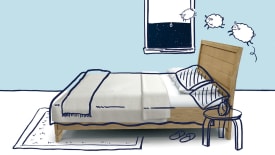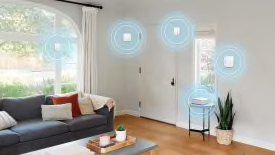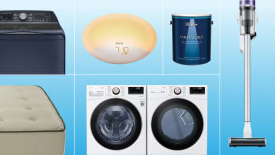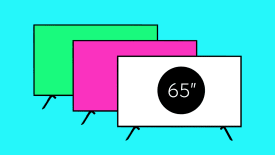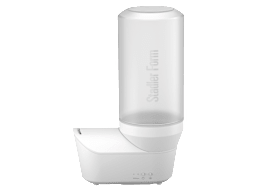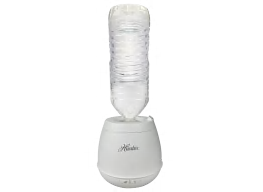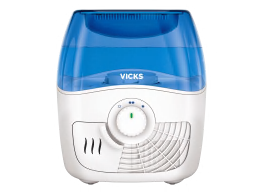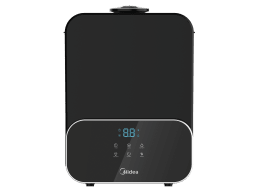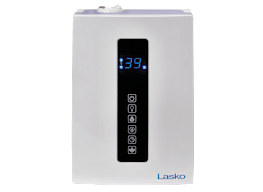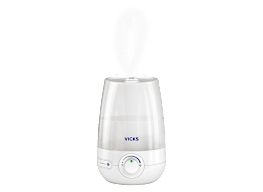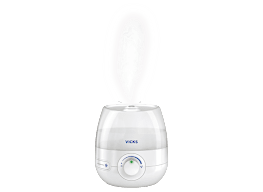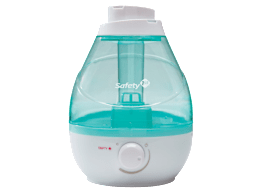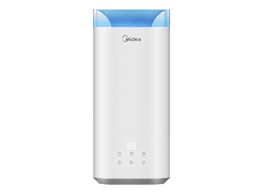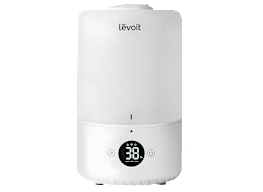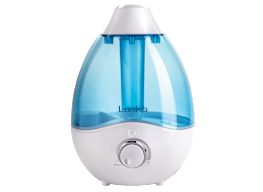Why the Right Home Humidity Matters
Your nose, eyes, and skin benefit. Pets and some belongings do, too.
When you shop through retailer links on our site, we may earn affiliate commissions. 100% of the fees we collect are used to support our nonprofit mission. Learn more.

How do you know you need a humidifier? Your body may very well tell you.
Especially in winter, when cooling temperatures lead to drier air indoors and out, your nose may feel a bit stuffy. Your skin may itch or flake. Your cuticles may crack, your lips may bleed, your eyes may burn.
A good humidifier can help relieve those symptoms by adding moisture to the air inside your home. The optimal relative humidity for indoor air is between 30 and 50 percent, far above the 10 percent it can drop to in winter. In colder climes, you should aim for an indoor relative humidity between 30 and 40 percent; any more will create condensation, according to Energy Star.
The right humidity benefits you in myriad ways. It can also be helpful to babies and children, pets, and items you own. Read on for details, and to see top choices from Consumer Reports’ humidifier tests for the best humidifiers for different-sized spaces in your home.
Eyes, Nose, Throat, and Breathing
A humidifier can help relieve irritated eyes and nasal passages, and dry throats, in winter, the Mayo Clinic says. It helps restore moisture inside the nose and throat, and can help maintain the eye’s aqueous, or lubricating, layer.
Skin, Nails, Cuticles, and Hair
Dry air pulls water from our bodies, making it hard for our skin, hair, and nails to retain moisture. The result can be itchy, flaky skin, cracked cuticles; nails that split more easily; and, for some, inflammation. Bathing in hot water also dries skin a lot.
Adding humidity to the air means less water evaporates from your body, says Steve Daveluy MD, associate professor and program director of the dermatology department at Wayne State University in Detroit. “We regularly recommend humidifier use in the dry winter months,” he says.
What else to do: Take shorter showers to reduce moisture loss, says Peter Burk, clinical associate professor of medicine at Albert Einstein College of Medicine in the Bronx, N.Y. Use a mild soap. Pat your skin dry and use a moisturizer that includes ceramide, adds Joseph L Jorizzo, MD, professor of dermatology at Wake Forest University in Winston-Salem, N.C. “That ingredient will help trap water against the skin,” he says.
Pets
Optimal indoor humidity for furry pets is generally the same as it is for humans, so using a humidifier to reduce dryness can be worthwhile, says Gene Pavlovsky, medical director of the Veterinary Medicine South Clinic at the University of Illinois College of Veterinary Medicine in Urbana. In some cats and dogs, he says, low humidity can lead to dry skin, which can create dander—and in some cases, mild itchiness.
What else to do: Tropical animals may need additional humidity to mimic their natural environments; check with your vet for details. Krista Keller, assistant professor of zoological medicine at the U of I veterinary school, advises owners of parrots—particularly species like Amazons and macaws—to take their birds into the bathroom when they shower. “That way, they get those nice, hot, humid water vapors,” she says.
Things Around Your House
Belongings made of natural materials such as wood and leather can be harmed by low humidity. Excessive dryness can shrink wood floorboards, creating gaps and making them creak. Wooden furniture can split. The pores in leather, which let in moisture, can shrink so the skins become less supple. Wooden instruments can fall out of tune and potentially warp. Maintaining optimal room humidity can help these items last longer.
What else to do: With valuable instruments, dedicate a space where you can keep the relative humidity between 45 and 55 percent, or buy a humidifier made for your instrument. (We found one on Amazon—essentially a pierced sponge-holder that you suspend inside the sound hole—for under $20.) Apply conditioner to leather, and never leave it outside. Keep wooden furniture out of direct sunlight and away from heat and air conditioning vents.
House Plants
While adding a humidifier to your home can aid in your comfort and help preserve some belongings, it doesn’t add much benefit to your plants. That’s because they create their own humidity. “Plants exude more moisture when it’s dry and less when it’s damp,” says Chris Raimondi, a horticulturist based in Hohokus, N.J., and an instructor of interior landscaping and plantings at the New York Botanical Garden. “They adapt to their surroundings.”
What else to do: You’ll still want to make sure your plants get the right amount of water, Raimondi says. Place every plant in an appropriately sized pot with a drain hole, and put every pot on a shallow dish or tray lined with gravel or small stones to raise it above runoff from watering. “You want to make sure the plant isn’t sitting in a bowl of water, which can cause root rot and stress the plant,” Raimondi says. “That can attract insects and invite disease.”
Need a New Humidifier?
Here’s a look at five top-rated humidifiers from Consumer Reports’ tests, one for each size we test, listed from small to larger.
For more shopping advice, see our humidifier buying guide. For test results and more options, CR members can check our complete humidifier ratings, which include units that range from personal size all the way up to consoles that can humidify 1,000 square feet or more.




